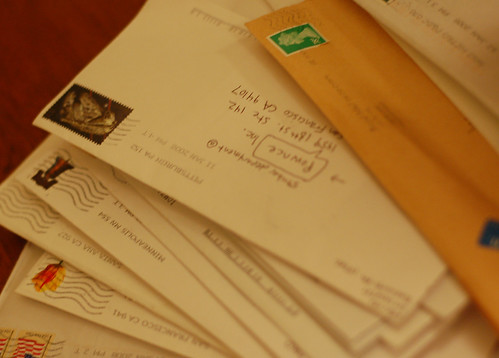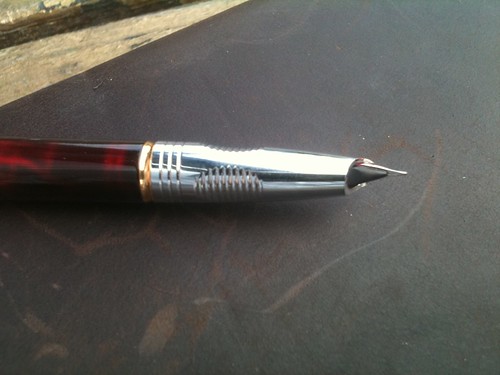"What is THIS?" Her eyebrows knit together in an angry scowl as she viewed the offending paper on her desk. A pair of bespectacled eyes, sparkling with rage, lifted to gaze around at the faces gathered in the room. "I told all of you not to do this!" One weathered hand disappeared into the desk, only to emerge with an item that made each of the thirty students quake with fear: a red pen. A collective shiver passed through the crowd as she lowered the tool to the page that had drawn her ire. "I warned you," she intoned ominously, then set to furiously applying pen to page. Back and forth, over and over, with furious strokes she eradicated the single word that had so offended her, then cackled with maniacal glee as the red pen bled through the page to damage a total of eleven more school papers. Every student watched as she counted them, every one, her laughter growing more chilling as she observed the damage she had wrought.
I was in the seventh grade, and I will never forget it. That's right: the story you see above is true, and it happened to me. I was not the student who made my English teacher lose her cool, but I will tell you this: never, on any day since that event, have I
ever used the word alot in any piece of writing...until this one.
Because it isn't a word, and thanks to this particular traumatic experience I vow that I will never forget it. But since we're talking about non-words, I would be remiss if I didn't call attention to another bastardization that has absolutely no place whatsoever in the English language: forever. Today, we're going to talk about words that aren't words, and words that shouldn't be given the dignity of being called words: alot and forever. I am pleading with you, as one writer to another, never to use them -- and not just because I still have frightening visions of red pens.
A Lot
I've seen plenty of mistakes in my never-ending quest to find great new indie reads, but none bother me more than improper use of the word
lot. All by itself, the word
lot means a big bunch of something (just don't check that with the OED, they phrase things quite a bit more poetically than I). If you've read the Harry Potter books, or for that matter any other books written by a British person, you'll see the word quite a bit. "You lot," is a common expression in England, and it means the same thing as its southern United States counterpart "y'all" (which I personally use). It's just another way of saying a bunch, and it's become common to see the word paired with "a" to become the phrase "a lot."
It's also become common in bad writing the world over to bastardize this into
alot, which is not a word in any proper dictionary whatsoever. Nor should it be, because it is
not a word. You cannot randomly shove two unrelated words together to form a new word. Doing so does not make you a brilliant writing pioneer.
It makes you a hack without a spellchecker. It's not acceptable to write
athought or
awalk or
abadbook, so why should it be okay to completely nullify a space between two very distinctly different words? There's only one answer: it is not. It's two tiny words, but it's a big mistake, and one that's very easily avoided. Use your "find and replace" function in your word processor to seek out and destroy any occurrences of "alot" in your work. Using it won't make you a maverick. It just shows that you have an improper command of language.
For Ever
I actually went toe-to-toe with an editor over the word
forever, and in the heated argument that ensued I quite frankly stated that I would
not, under any circumstances, attach my name to any piece of writing in which this word appears -- yes, even at the risk of losing my job.
She was completely befuddled by this hard-headed stance, and I admit that she had a right to her confusion. Look up
forever in Merriam-Webster, and you'll find it. To paraphrase, the word means
an infinite amount of time, though in the common vernacular it more frequently refers to
a long time. According to the online
etymology dictionary, this word has been in use since the 17th century.
Even back then, it was clearly a bastardization of the two separate words
for and
ever. Considering my knee-jerk, deep-seated hatred of the word
alot (which, again, is not a word), it should come as no surprise that I'll turn my nose straight up into the air upon seeing the word
forever. And I'm going to tell you why.
It clearly doesn't deserve to be a word.
Ever already denotes a length of time even when it stands on its own, and frequently it does.
For is a preposition that denotes support or favor, or a conjunction that serves as a synonym for
because or
since. When used separately, the phrase
for ever means
the exact same thing as its bastard cousin
forever.
So why in the hell should the word forever exist? Once again, I maintain that it should
not. If for no other reason, it's because of this one:
Waiting for forever. Is that not the dumbest line you've ever read in your life? Does it not sound utterly atrocious when you bring yourself to murmur it aloud (if you even can)? You cannot do something
for forever. You can do something
for ever, if you like, but it reads terribly if you're trying to do it
for forever. So, don't. I can't pull out my red pen when I see it, or lambast you for using it, because the dictionary has chosen to recognize it. But the dictionary has also chosen to recognize ridiculous words like
truthiness, so let us not use this as an end-all authority on words.
Words, an Ongoing Love Affair
Writers should be the end-all authority on words, because that is our job. When you put it in print, it represents you and it becomes a part of the world
for (space)
ever. Words are beautiful, they are powerful and they should, at all times, be treated with dignity and respect. So please, don't do
alot of anything
for forever. Because if you do, you're setting a terrible example and a potentially dangerous precedent. If
forever can be accepted into canon,
alot may not be too far behind. And if you don't love words enough to protect them from this sort of sullying, why are you calling yourself a writer?
























